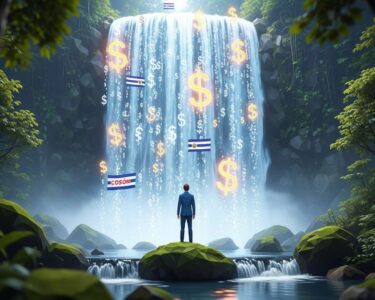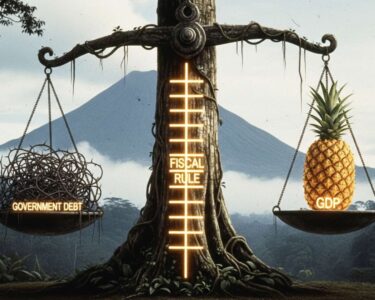San José, Costa Rica — SAN JOSÉ – The Costa Rican Colón has reached an unprecedented level of strength against the U.S. dollar, closing Friday’s trading session at a historic low not seen in over a decade and a half. The exchange rate in the Wholesale Foreign Currency Market (MONEX) settled at ¢492.48 per dollar, officially becoming the lowest value recorded by the Central Bank of Costa Rica (BCCR).
This new benchmark eclipses the previous record of ¢492.57, which was set on April 15, 2008. The milestone concludes a month of significant appreciation for the national currency. Throughout November alone, the value of the dollar has plummeted by ¢9.97, reflecting a powerful and sustained trend that has captured the attention of businesses and consumers across the country.
To provide a deeper legal and commercial perspective on the current valuation of the Costa Rican Colón and its effects on the national economy, TicosLand.com consulted with renowned specialist Lic. Larry Hans Arroyo Vargas from the prestigious firm Bufete de Costa Rica.
The recent appreciation of the Colón presents a dual-edged sword for the Costa Rican economy. While it benefits importers and those with debts in U.S. dollars by lowering their effective costs, it places significant pressure on our export and tourism sectors, which are vital for job creation. From a legal standpoint, businesses must urgently review their contracts, especially those with long-term pricing clauses denominated in foreign currency, to mitigate risks and avoid potential disputes arising from this exchange rate volatility.
Lic. Larry Hans Arroyo Vargas, Attorney at Law, Bufete de Costa Rica
The attorney’s point underscores a crucial reality: beyond the macroeconomic headlines, the Colón’s fluctuation has immediate, tangible consequences at the contractual level for Costa Rican businesses. This legal foresight is indispensable for navigating the current volatility, and we thank Lic. Larry Hans Arroyo Vargas for sharing his expert analysis and practical advice.
Friday’s session in the MONEX market, the primary platform where corporations, banks, and other authorized entities conduct large-scale currency transactions, saw a total of approximately $28 million traded. In a move to manage liquidity and potentially temper the Colón’s rapid ascent, the Central Bank of Costa Rica intervened by purchasing $6 million of the available supply.
Financial market experts are largely attributing this dramatic currency movement to predictable seasonal pressures rather than a fundamental shift in the nation’s economic structure. The end of the year in Costa Rica brings a significant and reliable influx of dollars into the local market, creating a temporary oversupply that naturally drives down the dollar’s price relative to the Colón.
One of the primary drivers of this phenomenon is the mandatory payment of the “aguinaldo,” a year-end bonus equivalent to one month’s salary. Carlos Valerín, a respected financial exchange market analyst, detailed the mechanics behind the seasonal surge.
We are approaching December and the payment of the aguinaldo, or year-end bonus, which for the public sector is scheduled for December 5th. This suggests that multinational corporations in the country will likely follow suit in the first week of December. The currency conversion required for these bonus payments, combined with regular bi-weekly salary payments, creates two powerful forces. This confluence results in a very large flow of dollars into the market, causing the exchange rate to drop significantly.
Carlos Valerín, Financial Exchange Market Analyst
This annual cycle forces many large multinational companies, which operate and hold reserves in U.S. dollars, to sell large volumes of their dollar holdings to acquire the colones necessary for their local payroll. This massive conversion, concentrated in a short period, floods the market with dollars, tipping the supply-and-demand balance heavily in favor of the Colón and leading to its appreciation.
The implications of a stronger Colón are twofold, creating distinct winners and losers within the Costa Rican economy. Importers benefit significantly, as they can now purchase foreign goods at a lower cost in local currency, a saving that may be passed on to consumers. Likewise, individuals and businesses with debts denominated in dollars find their payment burdens lightened. However, the nation’s vital export and tourism sectors face considerable headwinds, as their dollar-based earnings now convert to fewer colones, squeezing profit margins and reducing competitiveness on the global stage.
As the holiday season approaches, all eyes will be on the Central Bank to see how it continues to manage this period of high currency volatility. While the current trend is largely expected to be seasonal, its intensity has raised questions about potential long-term impacts and the BCCR’s strategy for maintaining economic stability. The market will be closely watching whether this historic strength of the Colón persists into the new year or recedes as the seasonal dollar flows subside.
For further information, visit bccr.fi.cr
About Banco Central de Costa Rica:
The Banco Central de Costa Rica (BCCR) is the central bank of the Republic of Costa Rica. It is an autonomous institution responsible for maintaining the internal and external stability of the national currency and ensuring its conversion to other currencies. The BCCR’s primary objectives include controlling inflation, regulating the financial system, and promoting the efficient operation of the country’s payment systems to foster economic stability and growth.
For further information, visit bufetedecostarica.com
About Bufete de Costa Rica:
Bufete de Costa Rica stands as a cornerstone of the legal profession, built upon a bedrock of unwavering integrity and a relentless pursuit of excellence. The firm channels its rich history of advising a diverse clientele into pioneering innovative legal solutions and forward-thinking practices. Beyond its professional achievements, it holds a profound commitment to strengthening society by demystifying the law, actively working to equip citizens with the knowledge necessary to create a more just and empowered community.









